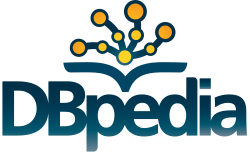- DBpedia
-
DBpedia 
http://dbpedia.org Kommerziell nein Beschreibung Semantisches Web Eigentümer Universität Leipzig, Freie Universität Berlin, OpenLink Software Erschienen 23. Januar 2007 DBpedia ist ein Gemeinschaftsprojekt der Universität Leipzig, der Freien Universität Berlin und OpenLink Software, um strukturierte Informationen aus Wikipedia zu extrahieren und Web-Anwendungen zugänglich zu machen. DBpedia ermöglicht es weiterhin, diese Daten mit Informationen aus anderen Web-Anwendungen zu verbinden.
Inhaltsverzeichnis
Hintergrund
Wikipedia-Artikel bestehen meistens aus normalem Fließtext, enthalten aber andererseits auch strukturierte Informationen, beispielsweise Infoboxen, Tabellen, Kategorien, geographische Koordinaten und Weblinks. Diese Informationen können extrahiert und als Datenbasis für fortgeschrittene Fragen verwendet werden. Im September 2011 enthielt DBpedia 3,64 Millionen Datensätze (things) mit mehr als einer halben Milliarde Einzeldaten (facts). [1]
Als Standard für die Daten wird das Resource Description Framework (RDF) benutzt. Als Quelle wurden unter anderem die englische, deutsche, französische, spanische, italienische, portugiesische, polnische, schwedische, niederländische, japanische, chinesische, russische, finnische und norwegische Wikipedia verwendet. Die Datensätze sind unter der GNU-Lizenz für freie Dokumentation und der Creative Commons-Attribution-ShareAlike-3.0-Lizenz verfügbar und mit anderen freien Datensammlungen (Open Data) durch den RDF-Standard verbunden. Dies sind beispielsweise Freebase, Open Cyc, UMBEL [2], GeoNames, MusicBrainz, CIA World Factbook, das Linked Open Data-Projekt der New York Times, Digital Bibliography & Library Project, Project Gutenberg, Jamendo, Eurostat und die US-Volkszählung.
Literatur
- Sören Auer u.a.: DBpedia: A Nucleus for a Web of Open Data. 6th International Semantic Web Conference (ISWC), Korea 2007. (PDF-Dokument)
Siehe auch
Weblinks
Einzelnachweise
Wikimedia Foundation.
